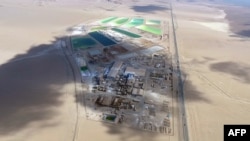An obscure mountain in the remote far west of Spain could prove to be a game changer in the race to end the West's dependence on China for a mineral that is key to the world's future mobility.
Valdeflores, just outside Caceres, a city of about 100,000 inhabitants in Extremadura, a region well off the tourist track, has been designated as the possible site for a lithium mine.
If the plan is approved, it is estimated the site will provide enough of the mineral used in rechargeable batteries to power 400,000 Tesla Model 3 cars every year.
Most important, there will be a processing plant next to the mine to turn the raw mineral into battery-grade lithium – the first in Europe.
Battery-grade lithium is one the minerals that will drive the next generation of electric cars as global economies seek to move away from conventional fuel-powered engines.
Growing demand for electric vehicles has spurred small-scale mining companies seeking lithium, cobalt and rare earths to develop mines and build refining capacity in Europe to reduce their reliance on China.
Picking up the pace
Efforts by the United States and Europe to build a secure and independent supply for the key minerals in electric vehicles, wind turbines and aircraft engines have sped up since the pandemic led to an economic slowdown and shortages.
As companies seek to reduce their carbon footprint, processing metals into goods that do not have to travel far is an environmental goal.
Currently, the majority of lithium mined in Argentina, Australia or Chile is sent to China to be processed into battery-grade lithium so it can be used in cars or for other products. Then it is sent back to the West to be used in car batteries, running up a sizable carbon footprint.
“There is a global race in Europe and the U.S. to change dependence on China for the processing of lithium, one of the key elements to make car batteries,” Caspar Rawles, of Benchmark Mineral Intelligence, a price reporting agency in mineral supplies, told VOA in an interview.
China currently controls 59% of processing plants and the United States 4%. According to Benchmark data, Europe has no major plants.
Extremadura New Energies, the company that hopes to start the Caceres mine and processing plant in a $633 million project, wants to change the reliance on China.
Opponents
The company, however, faces determined opposition from conservationists and city authorities in Caceres. A judge is expected to make a decision on the project later this year.
“More than having lithium, [the important thing] is to have the capacity to treat it so it can be used in a battery. We don't have that at the moment in Europe,” Ramon Jimenez, the CEO of Extremadura New Energies, told VOA in a Zoom interview.
“We don't want the lithium to travel to China to be processed and then coming back because we are creating a lot of CO2 that we are releasing to the atmosphere. This creates a big carbon footprint and is not good for the environment.”
China currently has 60%-70% of the lithium market. By 2030, Europe will reach 15% and the U.S. will have a 12% share, Jimenez estimated.
Jimenez said that after listening to conservationists' fears about the impact of the project, the company had changed its plans.
He said the mine would be underground and be powered using green hydrogen so it would be more sustainable.
Alejandro Palomo, of Salvemos La Montana (meaning Save the Mountain), the conservation group opposed to the mine, said that despite the change of plans, the mine would harm the underground water supply from the mountain on which the city of Caceres depends.
“It will also affect the air quality because of the chemicals which the processing plant uses. The mining may affect the historical center of the city, which was declared a UNESCO World Heritage Site in 1986,” he told VOA in a telephone interview.
He said “all the city” was against the plan for the mine, which would only bring 100 jobs, most of them in specialized fields.
Some information for this report came from Reuters.




